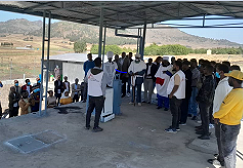By MSF Ethiopia Communications team: On Monday 12 February, a 43-year-old woman travelled for an hour by public transport to the health center nearest her home and then another hour and a half to reach Korem’s General Hospital.
She was referred from the health center because she was experiencing pregnancy-related complications a few days before her due date. The unborn child and the mother were at risk if she didn’t deliver the baby, that’s when the team decided to proceed with a caesarian section (C-section).
“In emergency situations, it is dangerous to wait for a natural delivery, so it’s in these cases when the teams decide to perform a C-section”, says Ryoko Hirayama, MSF OT Nursing Activity Manager in Korem. After one week in the hospital with appropriate care, the mother and her baby were successfully discharged.
Northern Ethiopia’s healthcare system was deeply disrupted by two years of conflict. In November 2022, a peace agreement was signed and some areas that were previously inaccessible due to insecurity began to open up and healthcare services were restarted. However, in many other areas, access to healthcare continues to be difficult for the people living there.
In December 2022, MSF started working in the areas surrounding the towns of Alamata and Korem after finding that health facilities had been destroyed in fighting, looted, were without any materials, and were struggling to get supplies. Communities had been living without medical care for months and years with serious physical and psychological consequences.
To ensure minimum humanitarian access for the provision of health care, two MSF mobile medical teams are now supporting seven health centers and three health posts in hard-to-reach areas. Between January and December 2023, a total of 31,072 medical consultations were done in five mobile clinics, of which more than 13,000 were children under five years old, and more than 6,500 women were provided with maternity or gynecology related healthcare. MSF has doubled the number of mobile clinics this year, from five sites in 2023, to ten sites in 2024.
While this has improved access to primary healthcare, it is still complex to refer patients with complications to hospitals and many health facilities lack materials and supplies to guarantee basic quality of care. Last year, from 8 March to end of December 2023, 238 patients were referred from the mobile clinics to Korem Hospital, of which a significant number were related to maternal healthcare. One of the main consequences of the difficulty in reaching health centers, is that pregnant women often deliver at home, which makes it more difficult for them to get the care they need if they experience complications during delivery.
On January 16, 2024, MSF together with the Ministry of Health (MoH) inaugurated the operating theatre (OT) in Korem General Hospital and a Comprehensive Emergency Obstetric and Newborn Care unit (CEmONC), where women with complications during pregnancy, delivery or after giving birth, and newborns are being provided with comprehensive care. The rehabilitation of the OT is a major achievement, which will improve access to surgical care and ensure that medical complications in pregnant women can be treated.
“We receive mothers with serious complications after giving birth at home. Many women have no other choice than to deliver at home. People have to walk two, three, up to five hours to reach a functional health facility”, says Chiara Martinotta, MSF Project Medical Referent in Ethiopia.
MSF teams in Korem also focus on providing health promotion trainings to staff in the hospital and to community health workers that live in hard-to-reach-areas.
“Community health workers can provide support in prevention activities when MSF can’t be there, they offer in time support and avoid patients driving five hours by car on bumpy roads. This guarantees a continuous presence of healthcare personnel to monitor mothers and babies after deliveries”, says Chiara Martinotta.
Almost two months after the inauguration of the operating theatre, MSF team together with MoH staff, made several surgeries, including seven emergency C-sections, and took care of the newborn babies and their mothers in the unit dedicated to their comprehensive care.
“We didn’t have many patients at the OT yet, but we already managed to save lives. We had some positive impact. The staff is improving, and we are feeling positive about the outcomes”, concludes Ryoko Hirayama.
MSF team in Korem foresees a positive long-term impact, especially with the efforts put in the capacity building of MoH staff, which is one of the project’s core elements.

